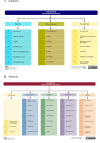A protocol using mixed methods for the impact analysis of the implementation of the EMPOWER project: an eHealth intervention to promote mental health and well-being in European workplaces
- PMID: 40204313
- PMCID: PMC11987133
- DOI: 10.1136/bmjopen-2023-082219
A protocol using mixed methods for the impact analysis of the implementation of the EMPOWER project: an eHealth intervention to promote mental health and well-being in European workplaces
Abstract
Introduction: Mental health at the workplace has been identified as a major priority by the World Health Organization (WHO). Despite its significance, international studies examining the influence of digital mental health interventions on workplace implementation and outcomes are lacking. The European Platform to Promote Well-being and Health in the Workplace (EMPOWER) platform is an eHealth intervention consisting of a website and web-based app designed to guide employers and employees on the prevention of common health problems, reduce presenteeism and absenteeism in the workplace. The aim of this paper is to describe the rationale and methods that will be used to conduct a maxi impact analysis of the processes undertaken to develop and implement the EMPOWER platform in European workplaces using the Global Impact Analytics Framework (GIAF) methodology.
Methods and analysis: We will undertake a mixed-methods analysis of the impact of the process of implementation in the two phases of implementation (initiation and maturity-the early implementation phase). The primary methodology that will be used for the analysis is the GIAF and toolkit. The GIAF toolkit includes a taxonomy (knowledge map), glossary and checklists to examine and rate the EMPOWER project across various domains of impact: planning, pre-engagement, readiness, usability, dissemination, adoption and uptake. Information will be collected from a range of sources through different methods and used to rate the EMPOWER platform (website and app) on each domain. For reliability and validity, four raters will independently rate the EMPOWER platform using the same information. The analysis will include qualitative and quantitative methods to rate on standardised ladders and scales in the GIAF toolkit. Analysis will include descriptive statistics and non-parametric tests where relevant. The information gained will be reviewed in a subgroup (per country) and group (three country) analysis for formative and key summative learnings. These key learnings will be synthesised to generate organisational learnings and insights for the EMPOWER consortium to improve future intervention implementation processes.
Ethics and dissemination: The impact analysis study protocol has been approved by the Research Ethics Committees of the University of Canberra (ID:202311841) and also the Fundació Sant Joan de Déu (PIC-39-20). The participating countries for the RCT (EMPOWER study) also obtained ethical approval through their respective ethical organisations in the participating countries. The impact analysis is registered with the Open Science Framework ID osf.io/eysc9. The EMPOWER project trial is registered at ClinicalTrial.gov with trial ID NCT04907604. The outcomes of the impact analysis study will be disseminated via conference presentations, peer-reviewed journals and key organisational learnings presented in relevant forums.
Trial registration number: NCT04907604.
Keywords: Behavior; Implementation Science; MENTAL HEALTH; Occupational Stress.
© Author(s) (or their employer(s)) 2025. Re-use permitted under CC BY. Published by BMJ Group.
Conflict of interest statement
Competing interests: None declared.
Figures
References
-
- World Health Organization. International Labour Organization . Mental health at work: policy brief. WHO and ILO: Geneva; 2022.
-
- Rosenberg S, Salvador-Carulla L, Lukersmith S, et al. Digital mental health and employment - Lessons from the Australian experience. Eur J Psychiatry. 2023;37:36–43. doi: 10.1016/j.ejpsy.2022.08.001. - DOI
Publication types
MeSH terms
Associated data
LinkOut - more resources
Full Text Sources
Medical

